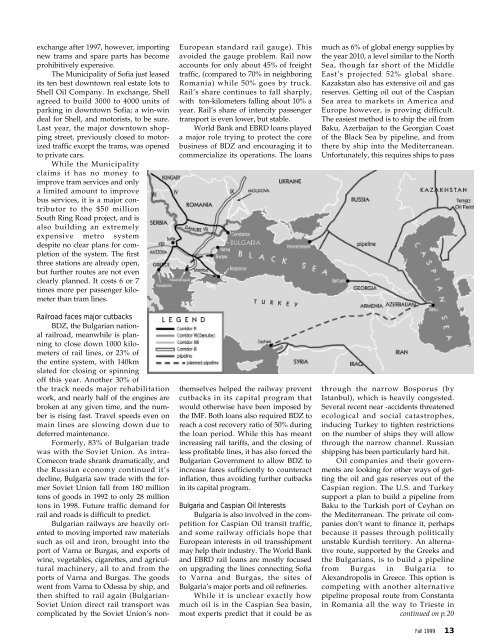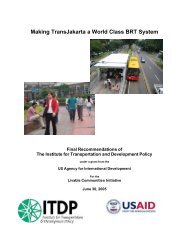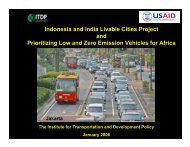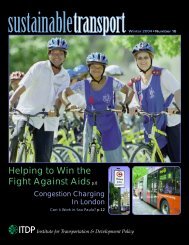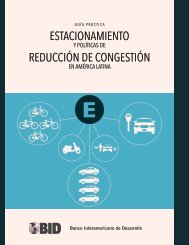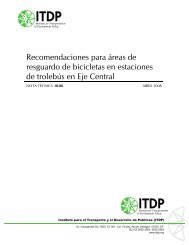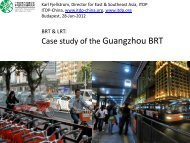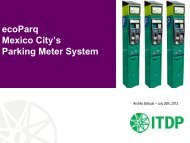Download PDF - ITDP | Institute for Transportation and Development ...
Download PDF - ITDP | Institute for Transportation and Development ...
Download PDF - ITDP | Institute for Transportation and Development ...
You also want an ePaper? Increase the reach of your titles
YUMPU automatically turns print PDFs into web optimized ePapers that Google loves.
exchange after 1997, however, importing<br />
new trams <strong>and</strong> spare parts has become<br />
prohibitively expensive.<br />
The Municipality of Sofia just leased<br />
its ten best downtown real estate lots to<br />
Shell Oil Company. In exchange, Shell<br />
agreed to build 3000 to 4000 units of<br />
parking in downtown Sofia; a win-win<br />
deal <strong>for</strong> Shell, <strong>and</strong> motorists, to be sure.<br />
Last year, the major downtown shopping<br />
street, previously closed to motorized<br />
traffic except the trams, was opened<br />
to private cars.<br />
While the Municipality<br />
claims it has no money to<br />
improve tram services <strong>and</strong> only<br />
a limited amount to improve<br />
bus services, it is a major contributor<br />
to the $50 million<br />
South Ring Road project, <strong>and</strong> is<br />
also building an extremely<br />
expensive metro system<br />
despite no clear plans <strong>for</strong> completion<br />
of the system. The first<br />
three stations are already open,<br />
but further routes are not even<br />
clearly planned. It costs 6 or 7<br />
times more per passenger kilometer<br />
than tram lines.<br />
Railroad faces major cutbacks<br />
BDZ, the Bulgarian national<br />
railroad, meanwhile is planning<br />
to close down 1000 kilometers<br />
of rail lines, or 23% of<br />
the entire system, with 140km<br />
slated <strong>for</strong> closing or spinning<br />
off this year. Another 30% of<br />
the track needs major rehabilitation<br />
work, <strong>and</strong> nearly half of the engines are<br />
broken at any given time, <strong>and</strong> the number<br />
is rising fast. Travel speeds even on<br />
main lines are slowing down due to<br />
deferred maintenance.<br />
Formerly, 83% of Bulgarian trade<br />
was with the Soviet Union. As intra-<br />
Comecon trade shrank dramatically, <strong>and</strong><br />
the Russian economy continued it’s<br />
decline, Bulgaria saw trade with the <strong>for</strong>mer<br />
Soviet Union fall from 180 million<br />
tons of goods in 1992 to only 28 million<br />
tons in 1998. Future traffic dem<strong>and</strong> <strong>for</strong><br />
rail <strong>and</strong> roads is difficult to predict.<br />
Bulgarian railways are heavily oriented<br />
to moving imported raw materials<br />
such as oil <strong>and</strong> iron, brought into the<br />
port of Varna or Burgas, <strong>and</strong> exports of<br />
wine, vegetables, cigarettes, <strong>and</strong> agricultural<br />
machinery, all to <strong>and</strong> from the<br />
ports of Varna <strong>and</strong> Burgas. The goods<br />
went from Varna to Odessa by ship, <strong>and</strong><br />
then shifted to rail again (Bulgarian-<br />
Soviet Union direct rail transport was<br />
complicated by the Soviet Union’s non-<br />
European st<strong>and</strong>ard rail gauge). This<br />
avoided the gauge problem. Rail now<br />
accounts <strong>for</strong> only about 45% of freight<br />
traffic, (compared to 70% in neighboring<br />
Romania) while 50% goes by truck.<br />
Rail’s share continues to fall sharply,<br />
with ton-kilometers falling about 10% a<br />
year. Rail’s share of intercity passenger<br />
transport is even lower, but stable.<br />
World Bank <strong>and</strong> EBRD loans played<br />
a major role trying to protect the core<br />
business of BDZ <strong>and</strong> encouraging it to<br />
commercialize its operations. The loans<br />
themselves helped the railway prevent<br />
cutbacks in its capital program that<br />
would otherwise have been imposed by<br />
the IMF. Both loans also required BDZ to<br />
reach a cost recovery ratio of 50% during<br />
the loan period. While this has meant<br />
increasing rail tariffs, <strong>and</strong> the closing of<br />
less profitable lines, it has also <strong>for</strong>ced the<br />
Bulgarian Government to allow BDZ to<br />
increase fares sufficiently to counteract<br />
inflation, thus avoiding further cutbacks<br />
in its capital program.<br />
Bulgaria <strong>and</strong> Caspian Oil Interests<br />
Bulgaria is also involved in the competition<br />
<strong>for</strong> Caspian Oil transit traffic,<br />
<strong>and</strong> some railway officials hope that<br />
European interests in oil transshipment<br />
may help their industry. The World Bank<br />
<strong>and</strong> EBRD rail loans are mostly focused<br />
on upgrading the lines connecting Sofia<br />
to Varna <strong>and</strong> Burgas, the sites of<br />
Bulgaria’s major ports <strong>and</strong> oil refineries.<br />
While it is unclear exactly how<br />
much oil is in the Caspian Sea basin,<br />
most experts predict that it could be as<br />
much as 6% of global energy supplies by<br />
the year 2010, a level similar to the North<br />
Sea, though far short of the Middle<br />
East’s projected 52% global share.<br />
Kazakstan also has extensive oil <strong>and</strong> gas<br />
reserves. Getting oil out of the Caspian<br />
Sea area to markets in America <strong>and</strong><br />
Europe however, is proving difficult.<br />
The easiest method is to ship the oil from<br />
Baku, Azerbaijan to the Georgian Coast<br />
of the Black Sea by pipeline, <strong>and</strong> from<br />
there by ship into the Mediterranean.<br />
Un<strong>for</strong>tunately, this requires ships to pass<br />
through the narrow Bosporus (by<br />
Istanbul), which is heavily congested.<br />
Several recent near -accidents threatened<br />
ecological <strong>and</strong> social catastrophes,<br />
inducing Turkey to tighten restrictions<br />
on the number of ships they will allow<br />
through the narrow channel. Russian<br />
shipping has been particularly hard hit.<br />
Oil companies <strong>and</strong> their governments<br />
are looking <strong>for</strong> other ways of getting<br />
the oil <strong>and</strong> gas reserves out of the<br />
Caspian region. The U.S. <strong>and</strong> Turkey<br />
support a plan to build a pipeline from<br />
Baku to the Turkish port of Ceyhan on<br />
the Mediterranean. The private oil companies<br />
don’t want to finance it, perhaps<br />
because it passes through politically<br />
unstable Kurdish territory. An alternative<br />
route, supported by the Greeks <strong>and</strong><br />
the Bulgarians, is to build a pipeline<br />
from Burgas in Bulgaria to<br />
Alex<strong>and</strong>ropolis in Greece. This option is<br />
competing with another alternative<br />
pipeline proposal route from Constanta<br />
in Romania all the way to Trieste in<br />
continued on p.20<br />
Fall 1999 13


